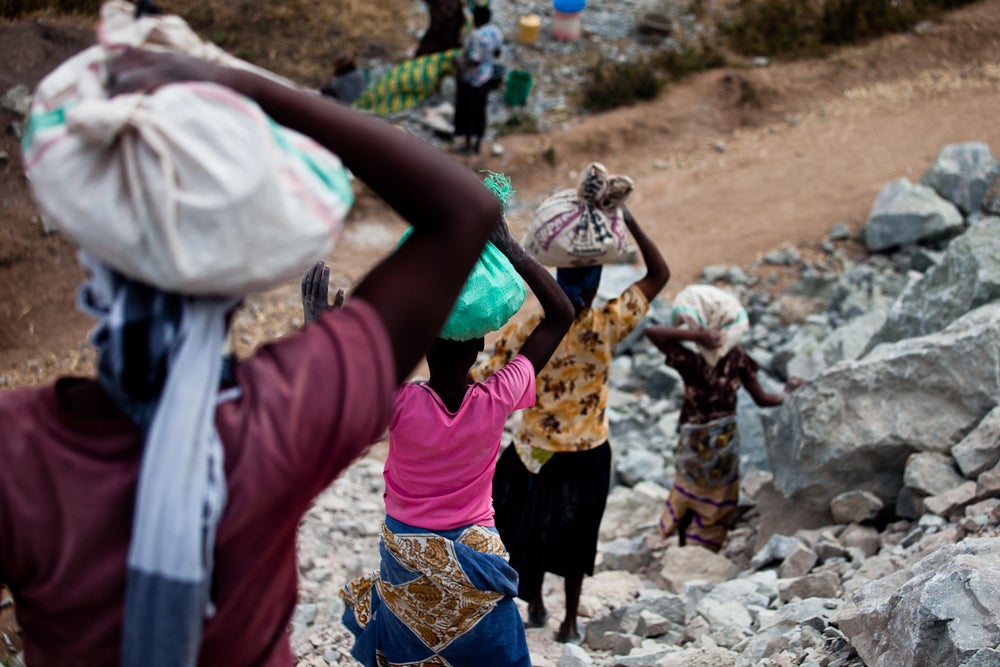(London, 5 November 2018) – Top executives at Barrick Gold and Randgold Resources have been warned about human rights abuses at Acacia Mining’s North Mara Gold Mine in Tanzania ahead of the merger between the two companies due to be voted on by shareholders this week. If approved the new merger would create the largest gold mining company in the world valued at $18bn (£13.7bn).
Last week, RAID, a watchdog that exposes corporate human rights violations in Africa, wrote detailed letters to John Thornton, Barrick’s Executive Chairman, and Mark Bristow, Rangold’s Chief Executive Officer, describing a disturbing pattern of human rights abuses by security personnel and Tanzanian police operating jointly at Acacia’s North Mara Mine. Barrick holds a 63.9 per cent stake in Acacia Mining, which is London listed, and has pre-emptive rights to acquire gold mining businesses and exploration right in Africa.
The human rights concerns, alongside charges of corruption against current and former mine staff (some relating to a period when Acacia was a Barrick subsidiary), and a 18-month long tax dispute with the government, are dramatically undercutting Acacia’s legitimacy in the eyes of Tanzanians. Bristow, who has a long experience in Africa and is due to head the newly created company, has warned of the business risks caused by poor corporate governance. The Tanzanian government has already imposed a costly export ban on Acacia.
“If shareholders approve the merger, Mr. Bristow will inherit a poisoned legacy in Tanzania of tax disputes, alleged corrupt land deals and a catalogue of unresolved human rights abuses,” said Anneke Van Woudenberg, Executive Director of RAID. “Mr Bristow and Mr Thornton should end the excessive use of force at the Mine against so called ‘intruders’ and ensure victims of abuse are fairly compensated through an independent process.”
RAID’s letters to Mr Bristow and Mr Thornton describe continued failures by Acacia to fairly compensate the Tanzanian victims, including the families of at least 22 people killed at or near the mine and dozens of others who have been seriously injured, maimed or raped since 2012.
One victim, 32-year old Zakaria Nyamakomo, was beaten so severely at the North Mara mine in October 2013 by Tanzanian police operating alongside the company’s mine security, that he was left paralyzed. Impoverished and confined to a wheelchair, he lodged a grievance with the mine in February 2015, but received no reply or compensation. Earlier this year, after RAID raised his case again, the company relied upon dubious and questionable police reports, which claimed Mr Nyamakomo had sustained his injuries during a drunken fight away from the mine, despite multiple eye-witness testimony to the contrary. Mr Nyamakomo’s claim is one of many that remains unresolved.
Acacia operates a grievance mechanism at North Mara, overhauled in December 2017, to permit victims to bring complaints and receive compensation. But the process lacks independence, transparency and presses the few victims whose claims are accepted to agree to minimal compensation. RAID, alongside other Tanzanian and international civil society groups, raised concerns directly with Acacia’s Board of Directors in April stating that the grievance process at the North Mara falls well short of the company’s human rights obligations and is not compliant with the United Nations Guiding Principles on Business and Human Rights.
RAID’s interviews with individuals who have gone through the process over the past year show they were not adequately informed about their right to the limited four hours of free legal advice, were not provided with the report about the company’s findings or received it only the night before their appeal committee hearing, were unaware of how the process worked, and some were pressed into accepting settlements.
“At a time when Acacia Mining’s contribution to the Tanzanian economy and its people is under intense scrutiny, Acacia should be implementing a grievance mechanism that puts victims first and treats them fairly, not one which jettisons basic human rights principles,” said Van Woudenberg.
Additional Links:
The letter to John Thornton of Barrick can be found here.
The letter to Mark Bristow of Randgold can be found here.
A video, Lethal Gold, on the human rights abuses at North Mara mine can be viewed here:
Further Background:
RAID and MiningWatch Canada documented at least 22 people killed and 69 injured, many by bullets, at or near the Mine between 2014 and 2016, though the numbers may be much greater. A 2016 Tanzanian parliamentary inquiry into the abuses at North Mara, for instance, received complaints of 65 killings and 270 people injured by police jointly responsible for mine security.
In September 2017, following a visit to the North Mara mine by a delegation of eminent legal judges and experts, the International Council of Jurists (ICJ) said it was “deeply concerned about the gravity of many of [the] allegations and the difficulties [victims] experienced in accessing any adequate remedy and reparation.”
In March 2017, after considerable pressure to publish further information, Acacia finally confirmed in its annual report that there had been 32 “trespasser-related” fatalities between 2014 and 2016. Although there has been a decrease in the number of deaths over the past two years, incidents continue to occur.
The lack of adequate remedy for the harm suffered is part and parcel of an overall lack of justice. To date, no police officer has been held to account by the Tanzanian authorities for the unlawful use of force or other serious human rights violations at North Mara. Acacia is also failing to adequately press for justice when violations are committed at its mines.
There have been repercussions beyond Tanzania. In 2013 a small number of victims engaged UK lawyers and brought their claims before the UK courts, since Acacia is a UK registered company. Acacia settled these claims in 2015. In 2017 a group of new victims instructed UK lawyers and also filed legal cases. These claims are yet to be resolved.

